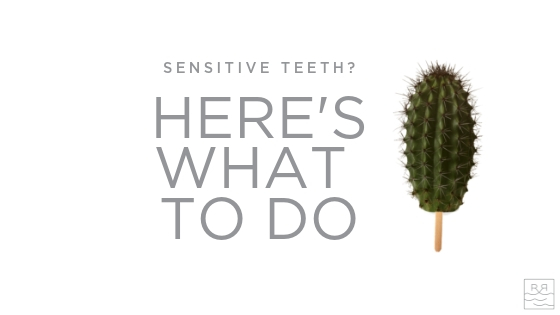Sensitive Teeth: What Can Be Done?

Have sensitive teeth ruined your favorite summer treats? Many of us are well too familiar with the painful, sensitive feeling felt in your teeth when taking a bite into something cold. On the other end, some of us may experience sensitivity when biting into something hot. Whatever the case may be, sensitivity in your teeth is never fun and can make everyday life a hassle. Luckily, if you are someone who experiences pain from sensitive teeth, it is treatable and preventable.
Studies show that more than three million adults in the U.S. suffer from tooth sensitivity. There are no “at-risk” groups for tooth sensitivity– it can affect anyone. In a healthy mouth, enamel protects the underlying layer of dentin on the teeth, and gums protect the roots of teeth. Tooth enamel is the strongest substance in the body (even stronger than bone)! Enamel is a hard, semi-clear, outer layer that protects teeth from everyday wear and tear. Overtime as the enamel erodes, teeth are more prone to sensitivity, cavities and decay.
Tooth sensitivity is most commonly caused by brushing too hard, too frequently, or by using a toothbrush that has hard bristles, which can eventually wear down the natural enamel on teeth. When this happens, the underlying layer of dentin (which is softer than enamel) is exposed, which is ultimately what causes the pain felt associated with sensitivity. Other causes of tooth sensitivity include gingivitis, plaque buildup, acidic foods, teeth grinding and clenching. If gingivitis (gum disease) or receding gums are the source of your sensitive teeth, it may be time to talk through a treatment plan with your dentist.
While a visit to the dentist is always the best option when experiencing tooth sensitivity, there are ways to help protect the enamel on your teeth and prevent sensitivity at home:
- Use a soft-bristled toothbrush and be gentle while you brush
- Avoid highly acidic and sugary foods
- Avoid grinding or clenching your teeth (mouth guards can help greatly with this!)
- Use an electric toothbrush to help control the amount of pressure you apply when brushing
- Use a fluoridated mouthwash every day
- Avoid mouthwash that contains alcohol, and opt for one that contains fluoride
- Brushing teeth twice a day with a fluoride toothpaste and flossing once a day
- Visit your dentist once every six months (or as often as recommended) for routine hygiene visits
The best way to avoid and prevent tooth sensitivity is to practice good oral hygiene. This not only protects against the erosion of enamel, but helps prevent tooth decay, gum disease and your overall health. If your tooth sensitivity is severe or ongoing, schedule a visit with your dentist.
